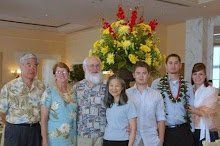Hypervideohttp://research.microsoft.com/apps/tools/tuva/index.html#data=2%7C%7C%7C
Monday, November 16, 2009
Monday, October 19, 2009
Thursday, October 1, 2009
Tuesday, September 8, 2009
application of the functional programming paradigm in the context of geometric algorithms
http://www.dinkla.net/fp/thesis.html
The implementation of geometric algorithms is often considered as difficult. This is due to the following three problems: inexact arithmetik, degenerated inputs and the correct implementation of complicated parts. The traditional method of software development is made responsible by researchers for the gap between theory and practice of geometric algorithms. We note, that the first two problems are caused by the nature of geometric problems and the last two problems by the methods of software development and the programming language used.
In the thesis is shown, that complex geometric algorithms can be implemented short, modular und with a high degree of abstractness in the functional programming language Haskell. Therefore functional programming possess the potential to reduce the two last mentioned problems.
Sunday, August 30, 2009
Watch the movie, or read the paper? Movie. ... Keywords Polygon interpolation · Morphing · Shape transformation · Refolding
Refolding Planar Polygons
Hayley N. Iben · James F. O’Brien · Erik D. Demaine
Thanks Hayley, James, and Erik. This really helps.
Friday, August 28, 2009
F# how you think … “19. A language that doesn't affect the way you think about programming, is not worth knowing". By Alan Perlis, "Epigrams in Programming"
Looking through other functional programming sites for wisdom to use in F#, found this by Seth Gordon.
http://www.haskell.org/pipermail/haskell-cafe/2006-November/019538.html
[Haskell-cafe] the case of the 100-fold program speedup
“ … In other words, I sped up the code by two orders of magnitude. …”
Seth quoted Perlis, and I concur.
Wednesday, August 19, 2009
Bay .NET presentation notice
How F#, Many/Multi-Core, and, Parallel and Concurrent Changed My World
Microsoft San Francisco Office
835 Market Street, Suite 700
San Francisco, CA 94103
Wednesday August 19th at 6:30 PM to 9:00 PM*
(Check-in begins at 6:00 PM)
_________________________________________
Event Description:
I'll share my motivations and experiences learning to have FUN with F#.
A quick review of some F# history, a bit more on the state of the F# art, and a few forward looking F# observations.
Start a conversation about building our dreams by harnessing F# to many/multi-cores.
Let's see what we can do with 100,000 times more personal compute power than we had last millennium and a new more expressive language.
Speaker's Bio:
Art Scott's interest in computer graphics started in the 70's; while living at The Berkeley Film House. It led him to a career, as an entrepreneur and intra-entrepreneur, in the Computer Graphic Industry; from Silicon Valley to SoMa.
From circuits to MadAve Art's seen how the power of graphics work; inside and out.
Art is using VS2010, .NET 4, WPF, F#, and multi-/many-cores --
having FUN investigating Tilings and Patterns, and, Parquet Deformations, working on Symmorphmetry, his art project.
Art is a member of the International Society of the Arts, Mathematics, and Architecture (ISAMA); and working on furthering the semasiographic revolution.
licon Valley.
Bay.NET is a California Nonprofit Corporation operated entirely by volunteers and we are proud of our service to the .NET community of the greater San Francisco Bay Area. We regularly provide world-class speakers at no cost to our members. We offer a full-day "Education Day" once every quarter for a nominal registration fee.
Friday, April 24, 2009
Wednesday, April 1, 2009
Let the FUN & games begin
Wednesday, April 01, 2009 10:57:59 AM (Pacific Daylight Time, UTC-07:00)
There is no light without heat...
Some will fight, some will flee.
Consumer visual network for me!
Intel, AMD, IBM I want to watch 4 (at least) games streaming;
To my pixel dust lipstick screen gleaming!
While clicking pizza offer at halftime,
Vid-screening to friends and family distant,
Virtual world interacting and gaming too!
Don’t make me wait while fools debate,
Invest; in parallel and concurrently!
I posted this doggerel at:


